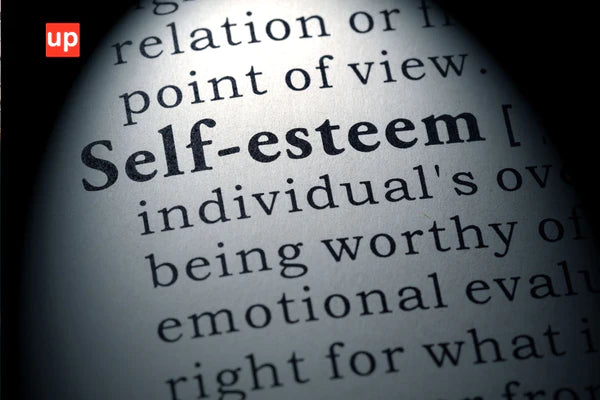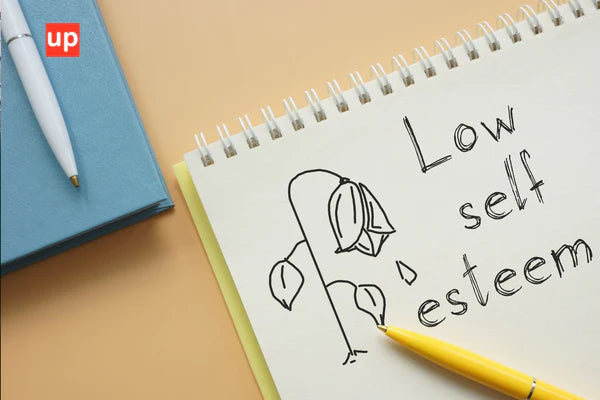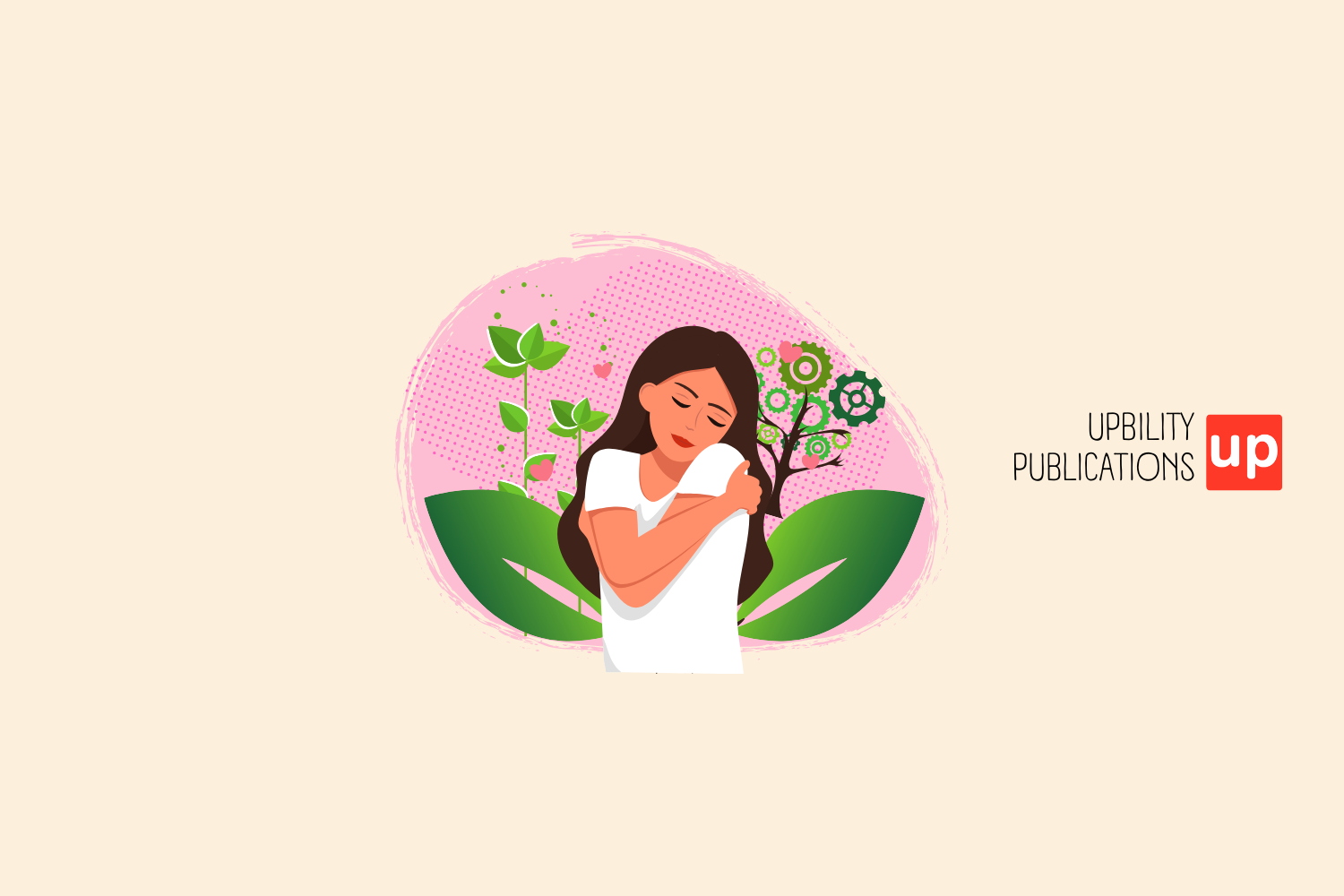Self-esteem determines how you see and value yourself, affecting your daily life. This article offers immediate tips for improving your self-esteem with seven strategies that promote self-confidence and overall well-being. Step by step, we'll help you build a stronger sense of self without overly complicating your journey.
Key takeaways
- Self-esteem is essential for resilience and positive self-concept and can be developed and nurtured over time.
- Practicing self-compassion, challenging negative thoughts and celebrating personal achievements are key strategies for boosting self-confidence and happiness.
- Establishing healthy boundaries, engaging in physical activity, and cultivating positive relationships are practical ways to enhance self-esteem and overall self-worth.
Understanding self-esteem: the foundation of your inner dialogue

Self-esteem acts as a catalyst, unlocking your full potential. It's the voice in your head that speaks when you face challenges, the little whisper that tells you that you can do it, even when things get tough. Self-esteem shapes our decisions, builds resilience and guides our inner dialogue, directing us either towards positive affirmations or negative self-criticism. Some people have self-esteem in almost all areas of their lives, while others only in certain areas.
Interestingly, self-esteem is not a static trait. It can fluctuate and grow, providing ample opportunities for personal growth. At its core, self-esteem involves understanding and valuing oneself beyond mere achievements, forming the foundation of genuine self-esteem.
Therefore, fostering good self-esteem can promote happiness and self-confidence.
The impact of low self-esteem on your life
Unfortunately, low self-esteem can trigger a host of mental health problems, including
- depression
- learning disorders
- anti-social behaviour
- eating disorders
- suicidal thoughts
It highlights the importance of recognising and addressing these issues to build self-esteem.
However, the impact of low self-esteem extends further. It can lead individuals to overlook their basic needs, make concessions to intimacy and accept less than they deserve, affecting the quality and fulfilment of their relationships. Some people with low self-esteem may adopt addictive behaviour towards internet use, choosing virtual reality as a distraction, a defence mechanism against it. People with low self-esteem often avoid difficult and complex situations.
Cultivating a positive sense of self through self-compassion

By turning our attention to a more positive aspect, how can we cultivate a positive self-perception? The answer lies in self-compassion, a critical element in building self-esteem that involves being kind and understanding towards ourselves, helping to improve our self-perception. One way to achieve this is by practicing self-compassion, which can contribute significantly to a healthier self-esteem.
Embrace kindness to yourself
Imagine treating yourself as you would a dear friend, offering support and comfort in times of distress. This means embracing kindness towards yourself. It is about acknowledging your difficulties and emotional pain and finding ways to comfort yourself.
Practicing kindness to yourself is vital to building a strong and positive self-esteem, as it is directly linked to increased feelings of happiness, optimism, curiosity and connectivity, while reducing anxiety and depression. Thus, self-friendliness cultivates a growth mindset, fostering a belief in continuous self-improvement. Just imagine the positive impact it could have on your overall well-being.
Understand and forgive your flaws
Let's face it; we all have flaws. But instead of being obstacles, these flaws can be stepping stones to self-improvement and personal growth. It's all about recognizing these flaws and working on them to become the best version of yourself.
And here's the bottom line: forgive yourself for past mistakes. It may seem scary at first, but doing so can boost your self-esteem, improve your self-image and reduce your levels of depression and anxiety. Visualize the resulting positive impact on your overall mental health.
Celebrate your personal achievements
We often get so caught up in the hustle and bustle of life that we forget to pause and celebrate our achievements. Recognizing and celebrating personal achievements, regardless of their size, is fundamental to fostering self-esteem and self-confidence.
Consider. Every time you celebrate a small victory, you:
- You boost your self-confidence
- You start to feel more positive about yourself
- You remind yourself of your abilities
- Contribute to a more positive self-image
- Ultimately, you increase your chances of future success.
Release from negative thinking

Negative thinking acts as darkness, clouding your self-esteem. It manifests as an "inner critic", bombarding you incessantly with criticism and self-doubt.
However, by practicing mindfulness and identifying these negative thoughts, you can take the first step toward addressing this "inner critic" and reducing its effects.
Identify your negative thought patterns
Identifying negative thought patterns is like turning on the light in a dark room. It sets the stage for transformation, enabling you to become aware of the automatic negative thoughts and cognitive distortions that affect your behavior and emotions.
What strategies can help you master recognition of these patterns? Techniques such as:
- keeping a thought journal
- identifying automatic thoughts
- recognition of cognitive distortions
- awareness of common negative thought patterns can be incredibly useful.
Challenge and replace unhelpful thoughts
Now that you've identified these negative thought patterns, it's time to challenge them. Cognitive behavioral therapy offers powerful strategies, such as asking probing questions to challenge distorted thoughts and using cognitive restructuring techniques to identify and challenge these unhelpful thought patterns. Seize the opportunity to begin a positive transformation.
But it doesn't stop there. By practicing mindfulness, you can replace these unhelpful thoughts with more empowering ones. Imagine the transformation this can bring about in your self-esteem.
Establishing healthy boundaries for better self-esteem
Consider boundaries as the code of conduct for your relationship. They are guidelines that determine how you want people around you to behave, creating a space where you feel respected and valued.
Enforcing these boundaries can be a game changer for your self-esteem. It makes you feel more confident and boosts your self-esteem. But, what is the approach to setting these boundaries? It's about setting clear expectations and communicating your boundaries with compassion, understanding and respect for each other's expectations.
Physical activity: A step towards positive self-esteem

Physical activity, in addition to maintaining fitness, serves as a powerful means of boosting self-esteem. By exercising, you boost your motivation, practice setting and achieving goals, and build self-confidence through the release of endorphins, which contribute to a positive sense of self-esteem.
And the good news? Both exercises tailored to building self-confidence and regular physical exercise can contribute significantly to improving self-esteem. Therefore, lace up your sneakers and begin the journey to positive self-esteem.
Cultivating social contacts to boost self-esteem
Now, let's venture into the social sector. Did you know that your social connections can have a significant impact on your self-esteem? Positive relationships that boost self-esteem have to do with:
- Social support
- Social acceptance
- Self-confidence
- Empathy
Seek positive relationships
Imagine being surrounded by people who lift you up and encourage you. This is the power of positive relationships. Being around such people can significantly boost your mood, your mental health and your overall well-being. Immerse yourself in positivity and witness the transformation it brings about in your life.
But how can you distinguish between positive and toxic relationships? It all comes down to respect. In nurturing relationships, both parties provide mutual support for each other. On the other hand, toxic relationships are characterized by one partner imposing control and dominance over the other. Therefore, gravitate towards relationships that respect and elevate you.
You spend time with people who inspire you
Have you ever noticed how being around people who inspire you can boost your morale? Such people:
- Provide you with support, encouragement and honest feedback
- They give you support, encouragement, support, feedback and encouragement.
- They celebrate your achievements
- Encourage you to overcome your fears and pursue your ambitions
But, what is the strategy to align yourself with such individuals? Here are some steps you can take:
- Actively engage with like-minded people
- Seek out those who have achieved remarkable things
- Distance yourself from negative influences
- Make an effort to connect with successful people who inspire you
- By surrounding yourself with inspiration, you can see your self-esteem soar.
Overcoming the comparison trap

Admittedly, we all sometimes fall into the trap of comparison. But did you know that by understanding the impact of these comparisons, you can take control and work towards building a healthier self-esteem? Here are some steps you can take:
- Focus on your own journey
- Surround yourself with positivity
- Limit exposure to comparison stimuli, such as social media
- Build positive relationships
- Challenge negative self-talk
By following these steps to improve self-esteem, you can begin to build a healthier self-esteem and free yourself from the comparison trap.
In fact, social media has a significant impact on the comparison trap and self-esteem, contributing to:
- predatory advertising
- influencers promoting idealized lives
- online bullying
- mental health issues
By appreciating your differences compared to others, you can boost your self-esteem and feel more confident in yourself.
Summary
In this journey of self-awareness, we explored the intricacies of self-esteem, understood its importance and delved into the consequences of low self-esteem. We also discovered strategies to cultivate a positive sense of self, free ourselves from negative thinking, set healthy boundaries, engage in physical activity, and cultivate social relationships.
But remember, self-esteem is not a one-time fix; it is an ongoing process of growth and introspection. So, continue to practice self-compassion, challenge negative thoughts, set healthy boundaries, stay active, cultivate positive relationships, and most of all, celebrate your unique self. Here's to a happier, more confident you!
Frequently asked questions
How can I improve my self-esteem?
You can improve your self-esteem by recognizing your strengths, challenging negative thoughts and creating positive relationships. Celebrate your victories and be kind to yourself by practicing self-care and setting boundaries in your relationships. These steps will help you feel better about yourself.
What causes low self-esteem?
Low self-esteem can be caused by an unhappy childhood with judgmental parents or teachers, poor academic performance leading to a lack of self-confidence, and constant stressful life events such as relationship breakups or financial problems. Take steps to address these issues and boost your self-esteem.
What are 10 ways to improve your self-esteem?
Incorporate self-care activities such as adequate sleep, healthy eating and physical activity. Surround yourself with supportive people and focus on what you can change to improve your self-esteem.
What is self-esteem and why is it important?
Self-esteem is vital for unleashing your full potential, shaping your decisions, building resilience and guiding your internal dialogue towards positive affirmations instead of negative self-criticism. It enables you to navigate life with confidence and courage.
How does low self-esteem affect mental health?
Low self-esteem can have a significant impact on mental health, leading to a range of issues such as depression, learning disorders, anti-social behaviour, eating disorders and even suicidal thoughts. It is important to address low self-esteem to promote overall wellbeing.
References
- Orth, U., Robins, R. W., & Widaman, K. F. (2012). The development of self-esteem across the lifespan and its effects on important life outcomes. Journal of personality and social psychology, 102(6), 1271.
- Sowislo, J. F., & Orth, U. (2013). Does low self-esteem predict depression and anxiety? A meta-analysis of longitudinal studies. Psychological bulletin, 139(1), 213.
- Baumeister, R. F., Campbell, J. D., Krueger, J. I., & Vohs, K. D. (2003). Does high self-esteem cause better performance, interpersonal success, happiness, or healthier lifestyles? Psychological science in the public interest, 4(1), 1-44.
- Mruk, C. J. (2006). research, theory and practice on self-esteem: Toward a positive psychology of self-esteem (3rd ed.). Springer Publishing Co.
- Rosenberg, M. (1965). Society and adolescent self-image. Princeton, NJ: Princeton University Press.
- Neff, K. D. (2003). Self-compassion: An alternative conceptualization of healthy attitudes toward the self. Self and identity, 2(2), 85-101.
- Beck, A. T. (1979). cognitive treatment of depression. New York: Guilford press.
- Cacioppo, J. T., & Patrick, W. (2008). loneliness: Human nature and the need for social connection. New York: Norton & Co.
- Deci, E. L., & Ryan, R. M. (2008). Self-determination theory: A macro theory of human motivation, development, and health. Canadian psychology/Psychologie canadienne, 49(3), 182.
- Crocker, J., & Park, L. E. (2004). The costly pursuit of self-esteem. Psychological bulletin, 130(3), 392.










